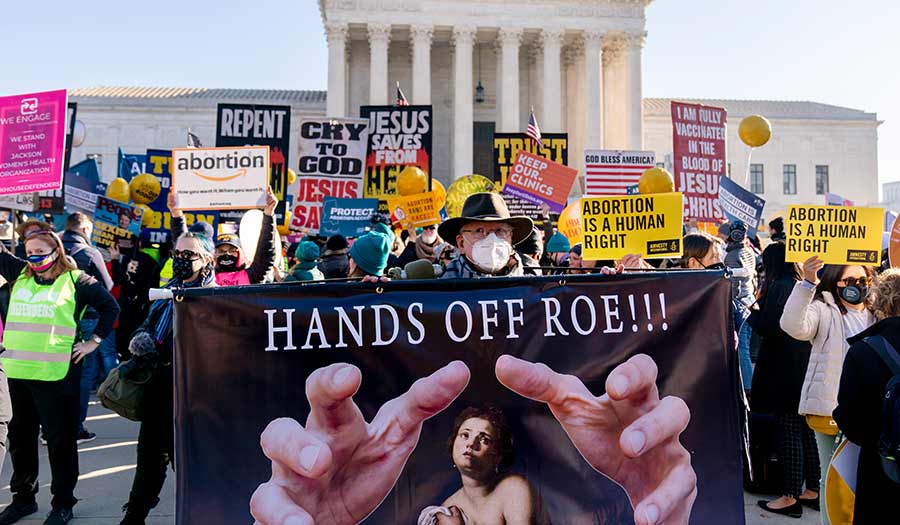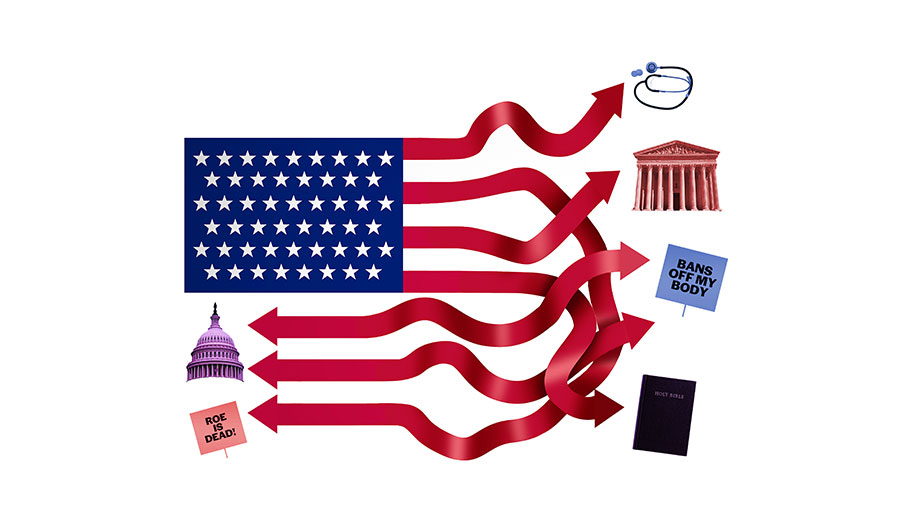 AP/Andrew Harnik
AP/Andrew Harnik
World News Desk
Learn the why behind the headlines.
Subscribe to the Real Truth for FREE news and analysis.
Subscribe NowOne year ago, the U.S. Supreme Court rescinded a five-decade-old right to abortion, prompting a seismic shift in debates about politics, values, freedom and fairness.
Twenty-five million women of childbearing age now live in states where the law makes abortions harder to get than they were before the ruling.
Decisions about the law are largely in the hands of state lawmakers and courts. Most Republican-led states have restricted abortion. Fourteen ban abortion in most cases at any point in pregnancy. Twenty Democratic-leaning states have protected access.
Here is a look at what has changed since the Dobbs v. Jackson Women’s Health Organization ruling.
Laws Have Been Enacted in 25 States to Ban or Restrict Abortion Access
Last summer, as women and medical providers began to navigate a landscape without legal protection for abortion, Nancy Davis’ doctors advised her to terminate her pregnancy because the fetus she was carrying had no skull and was expected to die soon after birth.
But doctors in Louisiana, where Ms. Davis lived, would not provide the abortion due to a new law banning it throughout pregnancy in most cases.
At the same time, abortion opponents who worked for decades to abolish a practice they see as murder cheered the Supreme Court’s Dobbs ruling. Anti-abortion groups said the 1973 Roe v. Wade ruling that legalized abortion nationwide was undemocratic because it prevented states from enacting bans.
“The Dobbs decision was a democratic victory for life that generations fought for,” said E.V. Osment, a spokeswoman for Susan B. Anthony Pro-Life America, a major anti-abortion group.
While some states scrambled to pass new restrictions, others already had enacted laws that were designed to take effect if the court overturned Roe.
More than 25 million women ages 15 to 44, or about 2 in 5 nationally, now live in states where there are more restrictions on abortion access than there were before Dobbs.
Ms. Davis got help from a fund that raises money for women to travel for abortions and went to New York for a procedure. The whole experience was heartbreaking, she said.
“A mother’s love starts as soon as she knows she’s pregnant. That attachment starts instantly,” she said. “It was days I couldn’t sleep. It was days I couldn’t eat.”
Abortion Access Has Been Protected in 20 States
As some states restricted abortion, others locked in access. In 25 states, abortion remains generally legal up to at least 24 weeks of pregnancy. Twenty of them have solidified abortion rights through constitutional amendments or laws.
CHOICES Center for Reproductive Health had for decades treated patients seeking abortions in Memphis, Tennessee. After Tennessee’s abortion ban kicked in last year, the clinic opened an outpost three hours away, in Carbondale, Illinois.
“They’re coming from Tennessee, Mississippi, Arkansas and even Texas,” said CEO Jennifer Pepper. “But now they’re having to travel much farther.”
The Number of Abortions Is Not Clear
With lags and gaps in official reporting, the impact of the Dobbs ruling on the number of abortions is not clear.
A survey conducted for the Society of Family Planning, a nonprofit organization that promotes research and supports abortion access, has found that the number has fallen to nearly zero in states with bans and risen in neighboring states with fewer restrictions, and on balance the number of abortions declining. But the survey does not capture self-managed abortions outside the traditional medical system, usually done through a two-pill regimen.
Before the Dobbs ruling, pills were already the most common method of abortion in the U.S. Now, there are more networks to provide access to pills in states with abortion bans.
Some abortion opponents are calling for the abortion drug mifepristone to lose its government approval. The Supreme Court has preserved access for now.
Lawsuits Abound
More than 50 lawsuits have been filed over abortion policy since the Dobbs ruling. Many challenges rely on arguments about the rights to personal autonomy or religious freedom. A Texas lawsuit alleges women were denied abortions even when their lives were at risk.
Bans or restrictions are on hold in at least six states while judges sort out their long-term fate. The only states where the top court has permanently rejected restrictions since the Dobbs ruling are Iowa and South Carolina.
Criminal Courts Have Not Been Busy with Abortion Cases
There is little evidence that doctors, women, or those who help them get abortions are being prosecuted.
The Mississippi attorney general’s office says no charges have been brought under a new law that calls for up to 10 years in prison for anyone who provides or attempts to provide an abortion in cases where it was not to save the woman’s life or to end a pregnancy caused by rape or incest.
Progressive prosecutors across the country, including in states with bans, have said that they would not pursue abortion-related cases, or that they would make them a low priority.
Abortion Remains a Dominant Political Issue
The political table has been reset, with Republicans entering a new election season weighing how to balance the interests of a base that wants the strictest bans possible against the desires of the broader electorate.
Polling has consistently found that most Americans think abortions should be available early in a pregnancy, but that most also favor restrictions later in a pregnancy.
Last year, voters sided with abortion-rights advocates in all six states with abortion-related ballot measures. The issue was also a major factor in why Democrats performed better than expected in 2022 midterm elections.
Abortion has emerged as a key issue in the race for the 2024 GOP presidential nomination.
This report contains information from The Associated Press.
- Real Truth Magazine Articles
- POLITICS
 Who Settles the Abortion Debate?
Who Settles the Abortion Debate?
More on Related Topics:
- Haiti Sees a Rise in Killings and Police Executions with Children Targeted, UN Says
- Thousands Survived a Brutal Gang Attack in Haiti that Killed 70. Now They Face an Uncertain Future
- Hunger in Haiti Reaches Famine Levels as Gangs Squeeze Life Out of the Capital and Beyond
- Railroads and Regulators Must Address the Dangers of Long Trains, Report Says
- 5 Things to Know About the Apparent Assassination Attempt on Donald Trump


